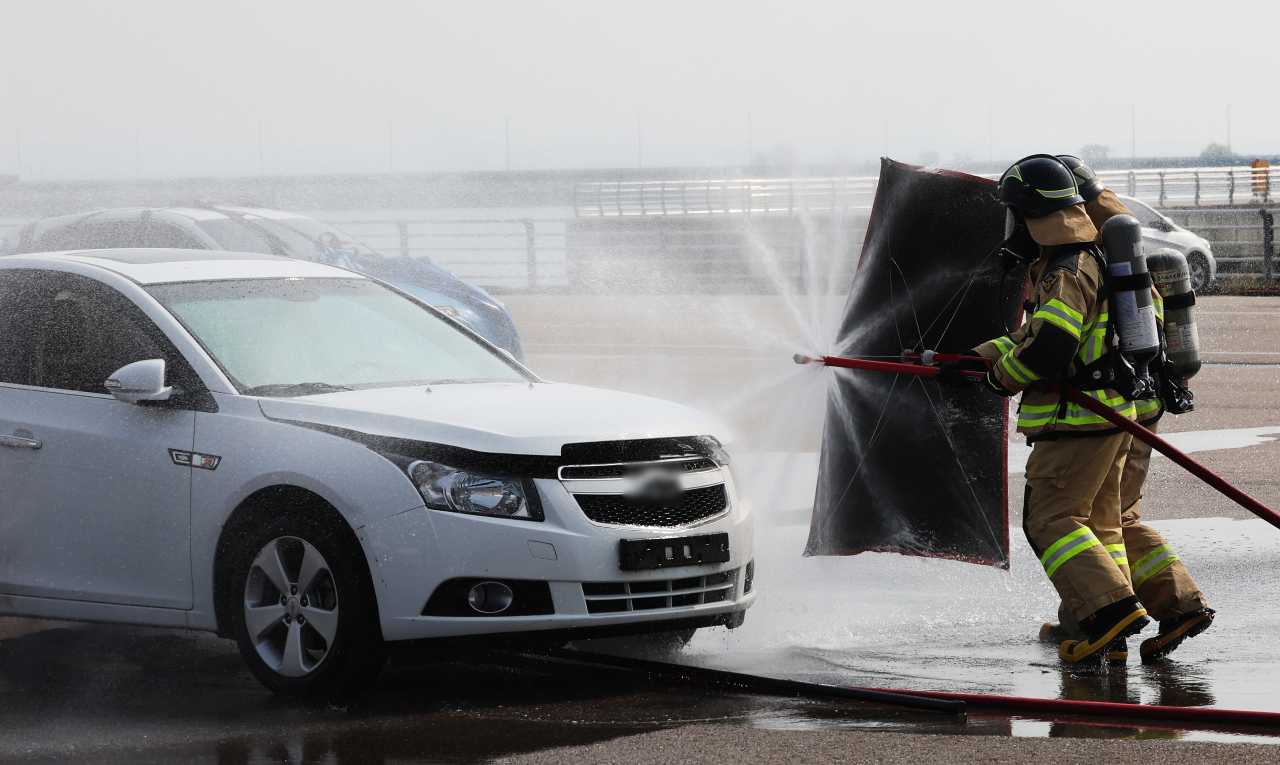 |
Firefighters demonstrate how to extinguish a fire on an electric vehicle in Pyeongtaek, Gyeonggi Province, Friday. (Yonhap) |
Ever since a Mercedes-Benz electric vehicle burst into flames in Incheon in August, an “EV phobia” has gripped drivers here.
Less than two weeks from the massive fire, Hyundai Motor Group, the nation’s largest carmaker, preemptively disclosed the list of its EV battery manufacturers, prompting its foreign rivals to hustle to reveal their respective battery origins.
A series of safety measures have also been unveiled from a new battery certification system to EV charger upgrades. But fears among owners of electric vehicles and potential buyers show little sign of abating. Industry watchers say this month’s EV sales are likely to hit a new low.
First mover advantage
Now all eyes are on the nation’s battery trio – LG Energy Solution, Samsung SDI and SK On – to see if they can help turn the tide with “fire-free” all-solid-state batteries. The “dream batteries” use solid electrolytes that are theoretically safer than conventional lithium-ion batteries with flammable liquid electrolytes.
With an aim to become the front-runner in the next-generation technology, Samsung SDI is speeding up development of all-solid-state EV batteries with sulfide solid electrolytes, known for their high level of ionic conductivity to boost charge and discharge rates.
“We have already sent the battery samples to five of our client companies and received positive feedback,” said an official from Samsung SDI. “The newly set up ASB business team is looking to expedite the mass production timeline by 2027.”
LG Energy Solution recently scrapped its plan to roll out a battery using a high-performance all-solid-state polymer electrolyte by 2026 and decided to focus on developing a sulfide-based all-solid-state battery by 2030. According to a company official, this is to enhance readiness for the more advanced battery technology.
LG is set to test its new lithium-sulfur batteries for the aerospace sector first. It is in talks to supply midspec cells for high-altitude uncrewed aerial vehicles and urban air mobility.
SK On is employing a two-track strategy for all-solid-state batteries using low-cost polymer-oxide and high-cost sulfide electrolytes to produce prototypes by 2028 and 2029, respectively.
Competitive edge over Chinese rivals
Given the fierce competition in battery technology at home and abroad, Korean companies might not be the first to launch these next-generation batteries. Several Chinese and Taiwanese startups have vowed to produce all-solid-state batteries by as early as next year. Yet industry insiders here do not seem overly concerned.
“In a situation where a defect in battery cells could lead to potential injury and criminal liability as well as substantial financial losses, would any carmaker use a venture firm’s solid-state-battery as a power source for EVs?” posed Yun Young-soo, a chemistry professor at Korea University.
“Corporate credibility is essential, not to mention a high level of proficiency not only in battery technology, but in software and other technologies. This means there are few companies capable of competing with global giants like Samsung SDI and LG Energy Solution.”
Yang Minho, an energy engineering professor at Dankook University, echoed the view and noted, “The battery ventures could have an exceptional technology in a ‘lab-scale,’ but not when it comes to mass production where the battery trio maintains superiority.”
A battery company official cast doubt on the ambitious production goals of overseas ventures, saying their batteries could be “semi-solid-state batteries” using gel-type electrolytes. They are easier and cheaper to make than those composed of a small amount of liquid electrolyte, with a weight ratio of less than 1 percent to the cell, or 100 percent solid-form electrolytes – the main targets of Korean battery-makers, according to Yang.
Price barrier
But the dream batteries are likely to have a price tag that raises eyebrows, limiting their application to a luxury segment, including supercars.
“The major issue with all-solid-state batteries is cost. The products’ competitiveness will depend on how much we can enhance their marketability based on improved energy density and safety. But this may take a significant amount of time,” said Go Joo-young, executive vice president and head of strategic marketing at Samsung SDI, at a conference in Seoul on Sept. 24.
Yang agreed, “In a lab scale, sulfide-based solid-state batteries are 200 times more expensive than those with liquid electrolytes in terms of production cost. So the key to expediting the mass production of solid-form batteries lies in how much a company could cut the cost.”
Yoon noted, “Solid batteries’ hefty price tags will likely make them challenging to compete with conventional lithium-ion batteries. It will take more than 10 years for them to dominate the rechargeable battery market.”





![[Herald Interview] How Gopizza got big in India](http://res.heraldm.com/phpwas/restmb_idxmake.php?idx=644&simg=/content/image/2024/11/20/20241120050057_0.jpg)

